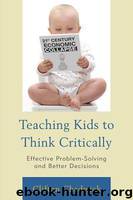Teaching Kids to Think Critically-Effective Problem-Solving and Better Decisions by Clifton Chadwick

Author:Clifton Chadwick
Language: eng
Format: mobi
Publisher: Rowman & Littlefield Publishers
Published: 2014-09-16T05:00:00+00:00
FOur
Metacognition:
Awareness for Thinking
This chapter and the following one present three closely related topics: metacognition (also known as cognitive awareness), affective variables that influence human learning, and general dispositions, which are the affective issues taken to the point of action. These three topics form the basis for the propensity to act positively in learning and in subsequent 95
Chadwick_WEB.indb 95
8/27/14 7:26 AM
96
Chapter Four
performance. In this chapter, we focus on awareness as it relates specifically to learning new information.
KNOWING WHAT YOU KNOW: METACOGNITION
The Master said, shall I teach thee what is wisdom? To know what we know, and know what we do not know, is wisdom.
—Confucius
A key aspect of thinking is awareness: of what you are thinking, of why you are thinking, of how you are thinking, what you know and what
you do not know, and where your thinking is or should be going. This awareness has been given a special name by psychologists. It is called metacognition, which means “cognition about cognition,” or what you think about what you think. Metacognition is the ability to reflect on, understand, evaluate, and guide one’s learning.
Research has established that the higher the levels of awareness a child has in early learning stages, the more effective and long lasting is the learning. This is important. The awareness allows and facilitates that the learner, your child, has more control over the process, has more knowledge of what she is learning, can more easily identify mistakes and correct them, and is aware of her rate of progress and other elements that clearly improve learning and achievement.
Accompanying what you know about what you know is the critical is-
sue of what you want to do, what your child’s motivation is, what his or her dispositions are, and how can you stimulate them. Knowing is important, but wanting to know, to do, and to achieve are even more important.
Good thinking is not only a skill but also a set of attitudes (more on this in chapter 5).
Your child may learn quite well all the cognitive strategies presented in chapter 3. But knowing the strategies does not necessarily mean that she will use them. The key to selecting and using them is awareness of her knowledge and of her process of learning. If she is aware that she does not know something or that she does not know it well enough, she may search for a strategy to help her improve learning.
Metacognition includes a person’s knowledge about the nature of
people as thinkers, about the nature of different mental tasks, and about possible strategies that can be used to solve various mental tasks. Major emphasis has been on what is called metamemory, or what you know
about what you know. This is knowledge about self and about knowledge and about available learning strategies. Also important is your child’s Chadwick_WEB.indb 96
8/27/14 7:26 AM
Metacognition 97
knowledge about when, why, and how to use strategies to facilitate
communication, perception and attention, general understanding, and problem solving.
This involves planning to learn, monitoring comprehension, and
evaluating progress. Your child also needs to
Download
This site does not store any files on its server. We only index and link to content provided by other sites. Please contact the content providers to delete copyright contents if any and email us, we'll remove relevant links or contents immediately.
| Administration | Assessment |
| Educational Psychology | Experimental Methods |
| History | Language Experience Approach |
| Philosophy & Social Aspects | Reform & Policy |
| Research |
The Art of Coaching Workbook by Elena Aguilar(48528)
Trainspotting by Irvine Welsh(20120)
Twilight of the Idols With the Antichrist and Ecce Homo by Friedrich Nietzsche(17738)
Fangirl by Rainbow Rowell(7874)
Periodization Training for Sports by Tudor Bompa(7361)
Change Your Questions, Change Your Life by Marilee Adams(6687)
This Is How You Lose Her by Junot Diaz(5830)
Grit by Angela Duckworth(4761)
Red Sparrow by Jason Matthews(4721)
Asking the Right Questions: A Guide to Critical Thinking by M. Neil Browne & Stuart M. Keeley(4628)
Paper Towns by Green John(4193)
Room 212 by Kate Stewart(4138)
Ken Follett - World without end by Ken Follett(3993)
The Sports Rules Book by Human Kinetics(3616)
Housekeeping by Marilynne Robinson(3443)
The Motorcycle Diaries by Ernesto Che Guevara(3364)
Exercise Technique Manual for Resistance Training by National Strength & Conditioning Association(3319)
Introduction to Kinesiology by Shirl J. Hoffman(3318)
Double Down (Diary of a Wimpy Kid Book 11) by Jeff Kinney(3303)
